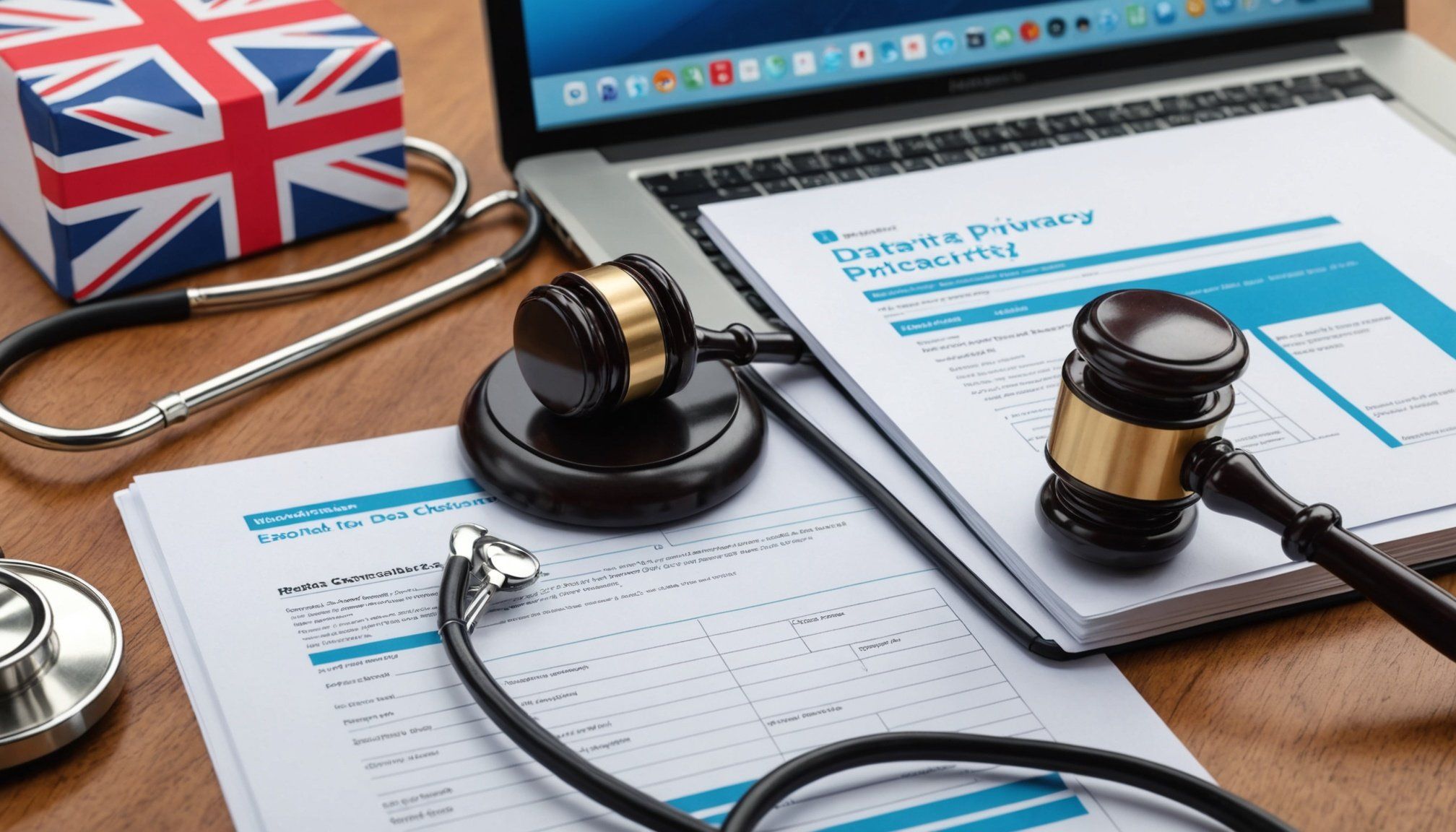Overview of Data Privacy Regulations in the UK Healthcare Sector
Data privacy regulations in the UK, especially those affecting healthcare, are principally shaped by the GDPR. This regulation applies stringent rules on how personal data, including health-related data, should be handled. For healthcare providers, this means there are explicit guidelines to protect patient information and ensure its responsible use.
Another critical component is the Data Protection Act (2018), which complements GDPR by incorporating additional provisions specific to the UK. This Act outlines the lawful basis for processing personal data and offers detailed instructions on compliance.
In parallel : Proven Tactics for UK Startups to Secure Venture Capital Funding
Healthcare providers possess key responsibilities under these regulations. They must secure patient data, limit access to it, and ensure its accuracy. Implementing comprehensive data security measures is not only mandatory but also a pivotal element that healthcare providers must integrate into their daily operations. Regular assessments and audits form the backbone of ensuring ongoing compliance, allowing organizations to identify and rectify vulnerabilities promptly.
Understanding these regulations empowers healthcare providers to safeguard their data effectively. By keeping abreast of these legal mandates, they can uphold the trust of patients and maintain the integrity of their operations while complying with UK healthcare compliance requirements.
Additional reading : Unlocking Visitor Engagement: 10 Innovative Strategies for UK Museums to Boost Growth and Discover New Opportunities
Practical Strategies for Compliance
To achieve robust compliance strategies in the UK healthcare sector, organizations need to focus on several pivotal practices. A primary step involves conducting thorough data protection impact assessments (DPIAs). These assessments help organizations identify potential risks associated with data processing activities and implement appropriate safeguards. DPIAs are essential in foreseeably reducing the likelihood of data breaches, ultimately protecting patient information.
Training staff on data protection best practices is equally crucial. Employees should be educated about data security protocols and the implications of non-compliance. Regular training sessions ensure that staff members are vigilant and capable of recognizing potential threats. Continuous education empowers personnel to handle sensitive data responsibly.
Additionally, healthcare organizations must carry out regular audits and monitoring to maintain adherence to compliance standards. Audits facilitate the identification of weaknesses in data management systems, allowing for timely interventions. Monitoring processes should be tailored to track compliance with both internal policies and external regulations.
Ultimately, a culture of vigilance and continuous improvement in data protection practices is essential. By prioritizing these strategies, healthcare providers can fortify their systems against threats while maintaining high standards of data protection for patient trust and safety.
Successful Implementation Case Studies
Examining real-world applications of data privacy can provide valuable insights into effective strategies and potential pitfalls in the healthcare sector.
Case Study 1: A NHS Trust’s Approach to Data Security
The NHS Trust adopted a robust strategy by implementing advanced data protection measures. By integrating encryption technologies and strict access controls, they significantly mitigated risks. Their proactive approach included regular data protection impact assessments (DPIAs) to anticipate and address potential vulnerabilities in patient data handling.
Case Study 2: Private Healthcare Provider’s Data Protection Strategy
In contrast, a private healthcare provider focused on staff training to enhance data security. They developed comprehensive data privacy protocols, ensuring every team member was well-versed in best practices. Regular workshops and seminars were integral to their regime, underscoring the importance of continuous staff education for robust healthcare data security.
Case Study 3: Lessons Learned from a Data Breach Incident
Despite these efforts, a healthcare provider experienced a data breach when an unauthorized access occurred due to outdated security systems. The incident highlighted the necessity of keeping systems updated and conducting periodic reviews. This case underscores the critical role of real-time monitoring and proactive security updates in safeguarding sensitive information.
Actionable Tips for Healthcare Providers
In the realm of healthcare data management, ensuring data security is paramount. Healthcare providers must adopt essential technologies to safeguard patient information effectively. Implementing robust systems like encryption and firewalls serve as frontline defenses against unauthorized access. Additionally, adopting advanced authentication methods, such as two-factor authentication, adds another layer of security.
Creating a comprehensive data breach response plan is crucial for timely and efficient handling of incidents. This plan should outline specific steps for containment, investigation, and communication following a breach. Regular drills and updates to the plan ensure readiness and minimize impact.
Engaging patients in their data privacy rights is another critical aspect. Transparency with patients about how their data is used fosters trust. Clear communication channels should be established so patients can access, update, or opt-out of data sharing. Educating patients about their data rights empowers them and fosters a collaborative approach to data security.
By focusing on these provider guidance strategies, healthcare organizations can not only protect sensitive information but also enhance patient confidence and compliance with data privacy regulations. Prioritizing these actionable tips strengthens both data protection and patient trust.
Resources for Further Learning
Engaging in continuous education is critical for healthcare providers aiming to excel in data privacy regulations. Here are noteworthy avenues to consider:
Training Programs and Certifications: Opting for certifications such as Certified Information Privacy Professional/Europe (CIPP/E) or certifications offered by the International Association of Privacy Professionals (IAPP) enhances understanding of GDPR in healthcare. These programs refine skills necessary for protecting patient data.
Helpful Websites: Websites such as the UK’s Information Commissioner’s Office (ICO) provide valuable insights and guidelines. ICO’s online materials support understanding of data laws and compliance strategies within the UK healthcare compliance framework.
Professional Organizations: Joining networks like the Data Protection Forum or the British Computer Society (BCS) Privacy Group can foster connections with experts. These forums offer rich resources and events tailored to data protection best practices.
By utilizing these resources, healthcare professionals can stay abreast of data protection trends and effectively contribute to maintaining patient trust and safety. Continuous education and engagement with these resources ensure that providers are well-equipped to navigate the complexities of data management and protection.










